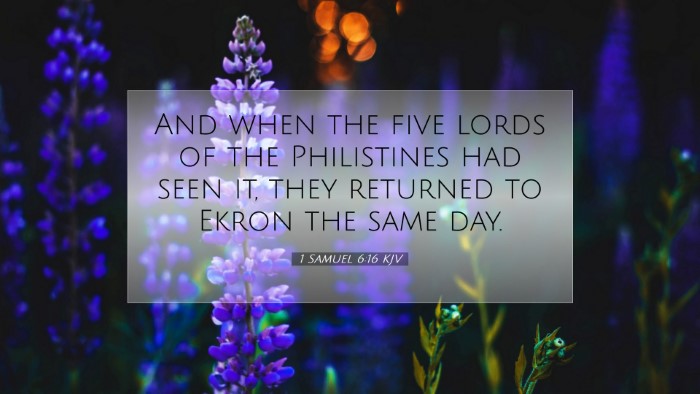Commentary on 1 Samuel 6:16
1 Samuel 6:16 states: "And when the five lords of the Philistines had seen it, they returned to Ekron the same day." This verse highlights a pivotal moment in the narrative of the Philistines' encounter with the Ark of the Covenant and their subsequent actions. The context is crucial for understanding the implications of their journey and the significance of the Ark.
Contextual Background
The events leading to this verse involve the Philistines capturing the Ark of the Covenant and their experiences while it was in their possession. These instances are chronicled in chapters 4 to 6 of 1 Samuel. The Philistines, upon acquiring the Ark, believed it would bring them victory over Israel. However, they soon faced severe repercussions, including plagues and unrest, leading them to recognize the power of the God of Israel.
The Significance of the Ark
The Ark of the Covenant symbolized God's presence among His people. Its capture was a traumatic moment for Israel, signifying the divine abandonment due to their unfaithfulness. The Philistines' struggles while keeping the Ark—afflicted by tumors and panic—emphasize the Ark's sacredness and God's sovereignty over all nations. The return of the Ark signifies not only a restoration of Israel's relationship with God but also a profound theological lesson for the Philistines concerning the authority and power of Yahweh.
Exegesis of 1 Samuel 6:16
-
Observation of the Lords of the Philistines:
The five lords observing the Ark's return represents the leadership structure of the Philistines (Matthew Henry). Each lord, likely from the principal cities of Philistia—Gaza, Ashkelon, Ekron, Gath, and Ashdod—signifies a significant political and military alliance. Their return to Ekron indicates a strategic retreat in light of their failed ambitions to contain the power of Israel's God.
-
Immediate Response:
The phrase "returned to Ekron the same day" indicates the urgency of their departure. Albert Barnes emphasizes that the lords, witnessing the tumultuous results stemming from the Ark's presence, sought to distance themselves from its ominous effects. Their promptness signifies recognition of their miscalculation in retaining the Ark and signifies a wise, albeit fear-driven, decision to return in the face of overwhelming adversity.
Theological Implications
The commentary by Adam Clarke suggests that this verse serves as a testimony of God's intervention not only for Israel but also as a warning to nations that oppose Him. The swift return of the lords reflects the universal truth of God's supremacy over worldly powers. It showcases how God’s holiness affects even those who do not serve Him, highlighting a pivotal theme in biblical theology: that God’s presence brings both judgment and protection.
Practical Applications
-
For Pastors:
The narrative serves as a reminder of the consequences of opposing God and the importance of revering His presence. Pastors can emphasize the need for a deep understanding of God's holiness in their ministries, encouraging congregations to live in a manner that honors God.
-
For Students and Theologians:
The verse invites exploration into the complex interactions between divine sovereignty and human agency. The Philistines' response unveils their recognition of divine judgment, making it a critical study point in Old Testament theology.
-
For Bible Scholars:
Scholars may examine the significance of political structures in ancient Israel and Philistia, using this verse and surrounding passages to analyze the interplay of faith, power, and cultural identity in ancient Near Eastern contexts.
Conclusion
The observation noted in 1 Samuel 6:16 offers profound insights into the dynamics of power, faith, and divine authority. As the lords of the Philistines return to Ekron, they carry with them a narrative replete with lessons about the supremacy of the God of Israel. This passage not only underscores the importance of God's presence in the lives of His people but also serves as a warning against complacency and irreverence towards the divine. It calls for reflection on our attitudes toward God and how we recognize His hand in our lives.


